England (Common Wealth) _ Former Bank of England Governor Mark Carney has blamed the current high inflation in Britain on Brexit, stating that he told the people that leaving the European Union would harm the economy.
The former governor also stated that he had been vindicated for predicting that Brexit would result in higher prices, a weaker pound, and slower GDP.
He consistently asserted that the economic repercussions of Brexit would be entirely negative, arguing that unemployment would rise under any scenario other than a “close” relationship with Brussels following Brexit.
“There’s no joy in saying, ‘Well, we told you so,'” he said in an interview, “because people have to live with that reality.”
Carney and his colleague issued a study in 2018 with doom-laden projections, including a no-deal scenario that might result in a 30% decrease in house prices and a recession worse than the financial crisis.
Carney, who led the Bank of England for seven years until 2020, stated that a series of “negative supply shocks” had disrupted the economy and resulted in an unexpected spike in costs.

He claimed that the single largest energy shock since the 1970s, combined with a dwindling workforce and the impact of Brexit, had prompted a “unique” adjustment in the UK, which might take years to undo.
We predicted that Brexit will cause a negative supply shock for a period of time, resulting in a weaker pound, higher inflation, and slower growth. And the central bank will have to fight back. That is exactly what has occurred. It happened coincidentally with other causes, but it is a distinct component of the economic adjustment that is taking place here.
Mr. Carney’s intervention comes as Prime Minister Rishi Sunak works to cut inflation in half this year.
Food costs, on the other hand, are rising at the quickest rate in 45 years, wage growth is solid, and chronic inflation has caused havoc in the mortgage market, with investors betting that interest rates would have to climb from 4.5pc to 5.75 percent to reduce inflation.
The Chancellor, Jeremy Hunt, has stated that the UK has “no alternative” but to hike interest rates in order to keep inflation under control.
Britain is hardly the only country experiencing high inflation. Germany, which is expected to have the slowest growth in the G7 this year, saw prices rise by 6% in the year to May, while Italy saw prices rise by 8%, somewhat lower than the UK’s headline rate of 8.7% in April.
Mr Carney, who is now the UN ambassador for climate change and finance, claimed that Brexit is to blame.
Brexiteers, he claimed, were “a group of people who portrayed it as something that was going to be seamless and positive and driving growth,” in contrast to the Bank and other “technocrats” who “based on analysis were sceptical of that.”
He stated that the unfavorable results had “proven to be true.”
Despite Mr Carney’s frequent warnings about the hazards of Brexit, the job market has been resilient, with the jobless rate hovering near its lowest since the 1970s.
According to most economists, the UK’s reliance on energy imports, along with a tight labor market, has been the primary source of persistently high inflation.








